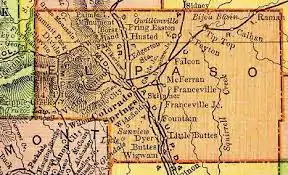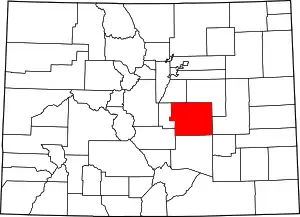Edgerton, Colorado
Edgerton was a settlement at the confluence of Monument Creek and West Monument Creek[2] and eight miles north of present-day Colorado Springs.[3] It was across from Black Forest.[4][5]

Stage station and hotel

In the 1860s, Edgerton Hotel was established as the first stage station north of Old Colorado City on the route to Denver. The stage coach horses were swapped for fresh horses at the station. The station and two-story Edgerton Hotel along old Camp Creek Road were run by Leafy Teachout and her son Harlow.[4][5] The site of the hotel, stables, and stone barn are in a meadow along the Santa Fe Regional Trail. There are some ruins of the stone foundations.[6]
Native Americans
Of the Native Americans who were in the area, the Ute people were friendly. They sold beads to settlers and would sometimes get a free meal of biscuits. The Cheyenne and Arapaho were hostile to the settlers, who make their houses to be like fortresses–make of stone and wooden walls as much as three-feet-thick. Some had narrow slots just wide enough to use to shoot a rifle from inside the house. Families would huddle together during uprisings.[6] In 1868, there were raids by Native Americans, who stole 150 horses from Harlow Teachout, and two young boys were killed in another raid.[4]
Railroad station and early village years
The Denver and Rio Grande Railroad was constructed east of Monument Creek[5] and a railroad post office was opened in 1870 at Edgerton.[3][7] In 1872, David Edgerton homesteaded 160 acres and established a ranch. The village grew around his ranch and was called Edgerton after him. In 1881, a post office and the VC Lewis Hotel were established.[8]
Village growth
Residents were engaged in the lumber industry.[3] Academy School District 20 was organized in 1886 by residents of Douglass, Pine, and Woodmen Valleys over a 36-square-mile area in 1874.[2] (Pine and Douglass Valleys are immediately northwest of the Edgerton town site.[9] Students from Woodmen Valley rode horses to school.[8]) Classes were held in houses until 1886 when the Edgerton School opened near the railroad stop for Edgerton. Located on a mesa above the mouth of West Monument Creek, it was the first schoolhouse for the district. It generally taught grades one through six, but sometimes up to grade eight.[2][10] Two lakes, one of which was called Ice Lake, were built by five pioneers in the mid-1880s. Their business was the Cascade Ice Company. During the winter they harvested blocks of ice from the lakes and sold the ice to keep food cool[9] before there was refrigeration. The ice was loaded onto insulated railroad cars to be transported for sale elsewhere. There are ruins of the dams used to create the lakes, but there is no evidence of the original "ice lakes".[8] The town also had a general store.[4][5]
The town's residents were upset after the Kearney Ranch murders of Mrs. Kearney and her six-year-old grandson, James Hand in 1886. Their bodies were found after they had been brutally murdered and signs that a meal that was about to be served. There were three place settings, but the identity of the additional person was not known, but believed to be the murderer and someone known to the family.[1][4]
There were 50 residents of the settlement in 1890 and 350 people living there by 1902. Many of the residents suffered from tuberculosis, and they came to the area seeking treatment.[8]
Transition
The hotel closed when the new and faster means of transportation meant few customers. It became a farm and ranch house, and then the property was leased as pasture land, and the building burned down in 1941.[5] The railroad post office closed in 1902 and it was moved to Pikeview.[3][7] The Edgerton School closed in 1915 with the opening of the Woodmen Valley School, which was the only school in the district until 1957.[2] When the highway, now Interstate 25, was built in the 1920s, there were even fewer visitors and it eventually ceased to exist as a village.[8]
The school site is now part of the Air Force Academy near the South Gate.[8][10][9] It is along the Santa Fe Regional Trail[8] that connects to the Pikes Peak Greenway at the Ice Lake trailhead.[11][6]
See also
References
- Linda Wommack. From the Grave: A Roadside Guide to Colorado's Pioneer Cemeteries. Caxton Press. p. 326. ISBN 978-0-87004-565-3.
- "Our History". Academy District 20. Retrieved July 22, 2018.
- George A. Crofutt (1885). Crofutt's Grip-sack Guide of Colorado: A Complete Encyclopedia of the State. Overland Publishing Company. p. 89.
- Stephanie Waters (July 31, 2012). Ghosts of Colorado Springs and Pikes Peak. Arcadia Publishing Incorporated. p. PT78. ISBN 978-1-61423-615-3.
- "Roger Teachout Visits Ruins Of Pioneer Edgerton House" (PDF). Gazette. Colorado Springs. August 22, 1954. p. B12. Retrieved July 21, 2018.
- Jack Anthony (January 4, 2005). "History Trail Run-Woodmen to Ice Lake" (PDF). Pikes Peak Road Runners - Newsletter article. Retrieved July 22, 2018.
- "Place Names of Colorado" (PDF). Denver Public Library. p. 201. Retrieved July 20, 2018.
- "Santa Fe Regional Trail". Tri lakes Guide. 2014. pp. 12–17. Retrieved July 22, 2018 – via Issuu.
- Anthony, Jack (January 2015). "10 cool "USAFA before USAFA" Historical Sites" (PDF). Aspen Leaves, USAF Academy Spouses Club. pp. 6–7. Retrieved July 22, 2018.
- "FunFacts". Academy School District 20. Retrieved July 22, 2018.
- Deb Acord (March 17, 2000). "City gets green backbone". The Gazette (accessed via HighBeam Research). Colorado Springs, CO.
